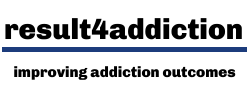Effective people research
selected articles
How therapists behave makes all the difference to treatment outcomes
Research into what makes an effective practitioner has produced remarkably consistent findings. Perhaps most important is that the way practitioners deliver a treatment makes a bigger difference than the treatment itself. This is not to say that the treatment choice is unimportant, but being friendly, respectful and having an understanding of addiction problems is crucial to engaging people in treatment. This classic research says it all…
Classic study :: How do you engage people in treatment?
Chafetz ME, Blane HT, Abram HS, Golner J, Lacy E, McCourt WF, Clark E and Meyers W (1962) Establishing treatment relations with alcoholics. Journal of Nervous and Mental Disease 134: 395-409
The researchers looked at what happened when people with alcohol problems attending an Emergency Room were seen by the regular staff compared to staff from an alcohol agency. The charts show engagement with the specialist staff was markedly better than with the regular staff and this was maintained over 12months.
It is all about being nice, being optimistic and showing expertise that gives confidence that you can help.
Not all therapists are equal
The next question is whether practitioners are born effective or learn to be effective. The answer is some of each and better questions are how much can be learned and what to do with practitioners who are not very good in spite of their best efforts.
Treatment outcomes vary quite markedly between therapists and there is no reason to suppose that this is not the case in most services. A strong clinical governance programme is perhaps the way to minimise variation. The next study is important because it was designed specifically to look at therapist effectiveness rather than the treatment they were delivering…
Important study :: Are all therapists equally effective?
Luborsky L, McLellan T, Woody GE, O'Brien CP and Auerbach A (1985) Therapist Success and Its Determinants. Archives of General Psychiatry 42: 602-611
The effectiveness of nine well qualified and experienced therapists was judged against a collection of outcome measures: Addiction Severity Index (ASI) (drug use, employment, legal status, psychiatric status), Beck Depression Inventory, a symptom checklist (SCL90) and a neuroticism scale. Outcomes were averaged across each practitioner’s caseload. The chart shows how variable the practitioners prove to be in helping people to get better - notice that the ninth practitioner consistently made people worse.
Note that measures of practitioners’ personal qualities, interest in helping, psychological health and skill correlated with their Helping Alliance Questionnaire score (r=0.74), which in turn correlated across all outcomes (r=0.65) and with adherence to treatment manuals (r=0.44). In other words all these things have an impact on outcome.
Service users want a ‘normal’ relationship with a knowledgeable practitioner
The Royal College of Psychiatrists has been proactive in looking at the effectiveness of its members. A study, How to Introduce Yourself , was interesting in showing, what some might see as the obvious, that when you meet a service user it is not enough to tell them your name; they also want to know what your role is and what the treatment session will involve, but they do not want to know anything personal about you.
The next study is about what service users think are important characteristics for their psychiatrist. We are not aware of any similar studies about addiction practitioners, but think it likely there would be many similarities…
Important study :: What sort of practitioner do service users want?
Laugharne R, Priebe S, Chevalier A, Paton C, Sharma RK, O’Kelly A and Richards G (2021) The sociocultural and behavioural characteristics that patients want in psychiatrists: cross-sectional survey of patients’ views. British Journal of Psychiatry Bulletin 45: 158–163 doi:10.1192/bjb.2020.115
This study asked 132 service users of mental health services what sociocultural characteristics they see as important in their psychiatrist. If repeated with addiction practitioners the results may be different, but they may well be very similar.
The four top ranking characteristics are not unique to any one profession or any given role, with the exception of having up to date medical knowledge (ranked 2nd most important), the characteristics are generic. 79% of service users wanted a practitioner who had been qualified for some time, meaning was experienced, and 73% wanted someone 40-55yrs. Otherwise the large majority rated gender, religion, social background or marital status low in importance. About a quarter of women expressed a preference to see a female or a (smaller number) male psychiatrist.
It is important that services strive to meet the preferences of all service users not just the majority, however large that might be.


